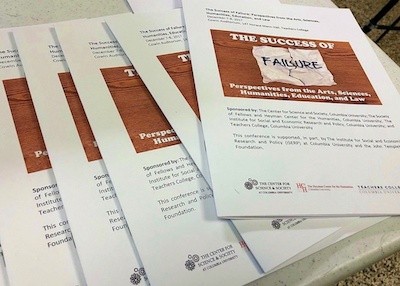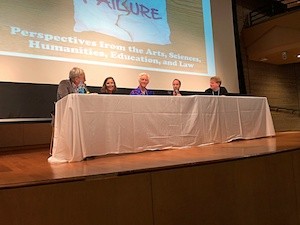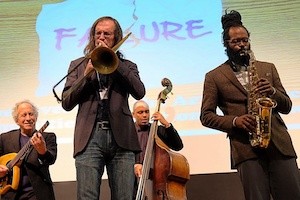Executive Summary - The Success of Failure: Perspectives from the Arts, Sciences, Humanities, Education, and Law

Artists, scholars, activists, and industry experts joined together to investigate “The Success of Failure: Perspectives from the Arts, Sciences, Humanities, Education, and Law” at Teachers College in December 2017. The conference was sponsored by the Center for Science and Society, the Heyman Center for the Humanities, the Institute for Social and Economic Research and Policy, and Teachers College, all at Columbia University.
Inspired by the April 2017 symposium, “Evidence: An Interdisciplinary Conversation about Knowing and Certainty,” this event was structured to explore the broad typology of failure across disciplines by offering perspectives from law, psychology, tech startups, education, experimental theater, and jazz music – just to name a few. Each field discussed its own struggles and solutions as participants and audience members grappled with the central question: How do we reconcile the contradictions of success and failure?
The conference explored the richness of unintended consequences as a key component of success and demonstrated the value of generative mistakes that focus as much on the “process” as the “results.” To unpack the contradictions of success and failure, speakers were guided by the following questions:
- What is the value of feedback?
- Is the experience of trying and failing a common necessity within society?
- To what extent is a community’s success built upon others’ failures?
- How do we reckon with victories shown in hindsight to be errors?
- How can the fear of mistakes be overcome?
Participants urged the audience to see the possibilities in errors. They often provide information which can encourage societal progress in relation to broader aims. Tim Wu argued that testing the limits of legal regimes through sustained and structured methods (civil disobedience as an example) highlights regulations that no longer reflect public desire. When these laws fail, social change can flourish – like the emergence of new civil rights.
The relationship between the personal and collective in scientific discovery challenges the assumed virtue of failure. The professional martyrdom of those whose publically failed while still advancing the overall pursuit of scientific knowledge suggests an ethical and social dilemma. Is the value of science-based on finding new avenues of exploration or the perceived success of the results? What effect does this antagonism have on scientific communities?

While mistakes in the laboratory are typically viewed as failures, accidental discoveries are often at the heart of many breakthroughs. This suggests the positive ways errors and unpredictability can be harnessed creatively – the “art of science.” Yet the world of experimental inquiry also provides many examples of delayed achievements only after decades of effort. Robert Siegler cited microbiologist Alexander Fleming’s ruined bacterial colony that ultimately lead to the discovery of penicillin. Failing at one goal often suggests a different, more important, one.
Narratives of failure can be used in educational settings help to normalize the inevitability of mistakes. Xiaodong Lin noted that students who studied the professional struggles of celebrated figures like Albert Einstein or Marie Curie reformulated failure as an essential part of intellectual pursuit, rather than an indication of intelligence or inability. Peter Norvig reminded the audience that the popular photo-sharing platform Flickr was a direct result of the Dot Com Crash – demonstrating how identifying and shepherding effective parts from failures can foster success.
Friction between individual success and communities is deeply interconnected with wider social failures. While an individualistic ideal of prosperity can hinder cooperation, Harry Collins showed how the professional dynamics of pursuing achievement can have costs on the singular and institution levels. While individual failure during skill building phases can have short-term discouraging effects, self-reflection is central to moving through the “learning curve.” Lisa Son argued increased degrees of difficulty should cultivate slow and deliberate “mistakeful” learning, even when success is not immediate or perceptible.
The social value of feedback helps determine how faults are categorized. Failure nudges people to abandon activities they do not excel at and divert their efforts to areas they thrive at. Yet the design thinking approach encourages students and computer programmers alike to make mistakes and embrace multiple iterative errors as tools inherently intertwined with success. Catherine Chase approached the psychology of blunders through the perspective of product design – the process of rapid prototyping inspired by its mantra, “make, test, think.” This “permission to fail” mindset reduces the stigma of missteps, by promoting trial and error as an integral part of the creative process.
“Failing forward,” (learning from mistakes and pursuing unexpected discoveries) transforms original goals by accepting deviations and delays as part and parcel of achieving the ultimate aims. As Chris Washburne and John Collins noted, embracing the possibility of errors is liberating and productive. In jazz music, mistakes are a key component of improvisation, forcing players to adapt, problem solve, and respond reactively to each other.

“The Success of Failure” presented an extensive survey of the approaches to this universal dynamic. The overlap between the norms of research and democracy pose fundamental questions about what science represents and the dynamics of truth. Judgments of failure should look beyond the results to the tools and practices used to generate knowledge, creativity, and the unintended consequences of our efforts.
